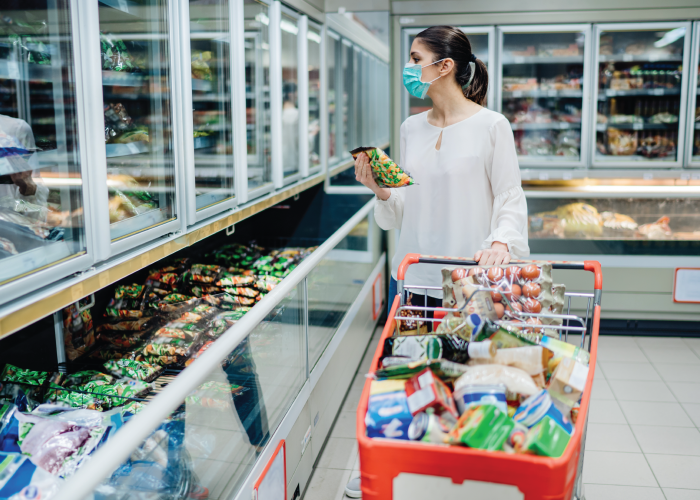Retail
In retail, creating an inviting atmosphere is key to attracting customers and encouraging them to stay longer. While lighting, layout, and product displays often get most of the attention, Indoor Air Quality (IAQ) is a less visible but equally important factor in shaping that experience. Fresh, clean air makes spaces feel more comfortable, reduces odours, and supports the wellbeing of both customers and staff.
From high-street stores to multi-floor shopping centres, retail spaces face unique challenges that can quickly compromise IAQ. Fluctuating visitor numbers, frequent door openings, and location-specific issues like traffic pollution or nearby construction can all impact the freshness and cleanliness of indoor air. A proactive approach is the best way to ensure your staff and customers enjoy their time in your store.
- Expectations
- Featured Project
- Insights
Expectations
Retail Sector
Poor ventilation in busy periods can lead to a noticeable build-up of CO₂, making the space feel stuffy and fatiguing for both shoppers and staff. Dust, allergens, and outdoor pollutants can enter through open doors and loading bays, while odours from cleaning products, deliveries, or nearby food outlets can linger. Inconsistent temperature or humidity can not only affect customer comfort, but also damage stock, displays, and fittings. Left unchecked, these issues can impact sales, staff wellbeing, and the overall reputation of the store.
If you're concerned about how your store's IAQ might be affecting your staff and customers, we're here to help. We have the expertise to diagnose even the most puzzling IAQ problems and the knowledge on how best to remediate them. Feel free to get in touch today or view our services to understand how we can enhance the customer experience in your store.
Relevant services
- HVAC Maintenance
- Fire Damper Testing
- Water Quality Testing
- TM44 Inspections
- Grease Cleaning
- Ductwork Cleaning

Featured Project
Balancing Energy Consumption with Indoor Environment Quality in Co-op stores

Objectives
ARM Environments were commissioned to conduct an Indoor Air Quality (IAQ) assessment across three Co-op East retail stores: a small store at Wadgate Road, a medium store in Sible Hedingham, and a large supermarket in Felixstowe. The aim was to evaluate whether these environments were providing healthy conditions for staff and customers, identify opportunities for energy savings via HVAC systems, and troubleshoot any IAQ issues.
To gather insight into the stores' IAQ, we deployed AWAIR sensors around each of the 3 sites, verified that they were functional and calibrated, and left them to run for 6 weeks over August and October in 2022. This rather long testing period was chosen because it allows us to see specific patterns that we might miss through a shorter time frame. Essentially, we wanted to discover any underlying issues with their IAQ and see where the stores might be able to save some energy. These AWAIR sensors measured temperature, humidity, carbon dioxide (CO2), Total Volatile Organic Compounds (TVOCs), and Particulate Matter (specifically PM2.5) and recorded the results for ARM Environments to view remotely.
Solutions
Through our analyses, we discovered that the IAQ within the Sible Hedingham store was generally quite good. Whilst the he CO2 levels dropped to around 500ppm outside of peak times, which indicates that the store might be slightly over-ventilating their space. 400ppm is the rough concentration in our outside air, and levels below 600ppm are considered very good by many organisations, so this store could save some energy by reducing the ventilation rates during off-peak times. The stores on Wadgate Road and Felixstowe also displayed similar levels of over-ventilation.
Concerningly, we noticed high spikes in TVOCs and PM2.5s at specific times of the day — right when the delivery truck arrived. As our sensors proved, the air quality within the store would be directly affected by the arrival of these delivery vehicles, making the air worse for the staff and customers inside.
In the Felixstowe store, the temperatures recorded were consistently lower than expected, dropping to just 15 degrees Celsius in some areas. We noticed that the air temperature sensors were located on the ceiling 3-4 metres above the floor and positioned directly above the chillers and freezers. As these units cool the space to keep items cool, they generate heat which can only drift upwards towards the sensor. Essentially, this results in the sensors constantly recording high temperatures as a result of the hot air rising to the ceiling, and as a result the air conditioning units were perpetually trying to cool the space down. So, the space became very cold for shoppers, meanwhile the sensor was stuck in thinking that the space needed to be colder.
Results
To address the TVOC and PM2.5 issue, we discussed the options available to prevent the delivery vehicles contaminating the indoor air with pollution in the Sible Hedingham store. The manager decided that the trucks should arrive earlier when possible, as this gives the store time to flush-out the Particulate Matter and VOCs. Additionally, they would ask their drivers to turn off the refrigeration unit just before pulling into the loading dock as this would reduce the emissions from the vehicle.
With regards to temperature, we advised the Felixstowe management team to change the set point of the AC systems to reduce the over-cooling. In the upcoming winter, these overactive AC units could still pose a problem, and so we suggested installation of stratification fans in the ceiling to circulate the warm air throughout the indoor space.
Challenges
- Multiple retail sites
- Pollution from delivery vehicles
- Uncomfortable indoor temperature
"While our client initially approached us just to get IAQ insights, the discussion soon drifted into how the stores might be using excessive energy. Understanding how their air quality systems work would be the first step in helping them to reduce their energy consumption, save money, and create a better environment for their shoppers. We encountered a few little problems in these sites, but thanks to long-term monitoring, they should now have a more comfortable space with the added benefit of actually saving some money."
Adam Taylor, CEO of ARM Environments
Wellbeing
Energy Reduction
Customer Experience
Insights
Related Insights
Discover Our Other Sectors
Education FAQs
Why is indoor air quality important in retail spaces? ↓
What are the common air quality issues in shops and shopping centres? ↓
Common problems include high CO₂ levels in busy areas, dust from stock handling, odours from cleaning products, and pollutants from nearby roads or delivery vehicles entering through open doors.
Can poor air quality reduce sales or customer footfall? ↓
Yes. Shoppers are less likely to stay in an uncomfortable environment. Fresh, clean air helps create a welcoming atmosphere that encourages browsing, repeat visits, and higher spending.
Do retail businesses need to meet specific air quality regulations? ↓
While there are no retail-specific IAQ laws, employers must comply with the Health and Safety at Work Act and COSHH regulations, which require managing pollutants that could harm staff or customers.
Do we need to replace our ventilation system to improve IAQ? ↓
Not always. Many improvements, like upgrading filters, optimising airflow, or installing localised air purifiers, can be made without the cost or disruption of replacing an entire system.
Concerned About IAQ?
Contact us today for expert advice and a professional survey.
Why Choose ARM?


